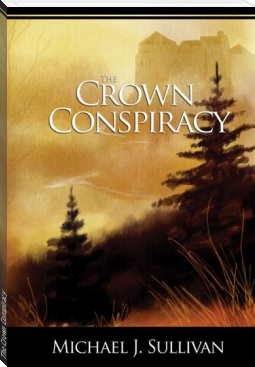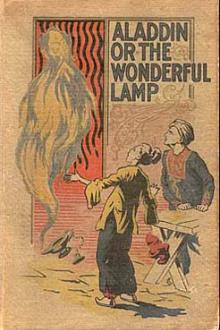Figures of Earth: A Comedy of Appearances by James Branch Cabell (best reads .TXT) 📗

- Author: James Branch Cabell
Book online «Figures of Earth: A Comedy of Appearances by James Branch Cabell (best reads .TXT) 📗». Author James Branch Cabell
So they bid each other farewell, and the Zhar-Ptitza picked up his nest of cassia and sprigs of incense, and flew away with it: and as he rose in the air the Zhar-Ptitza cried, "Fine feathers make fine birds."
"But that is not the true proverb, sir," Manuel called up toward the resplendent creature, "and such perversions too, they tell me, are a mark of would-be cleverness."
"So it may seem to you now, my lad, but time is a very transforming fairy. Therefore do you wait until you are older," the bird replied, from on high, "and then you will know better than to doubt my cry or to repeat it."
XII Ice and Iron
Then came from oversea the Bishops of Ely and Lincoln, the prior of Hurle, and the Master of the Temple, asking that King Raymond send one of his daughters, with a suitable dowry, to be the King of England's wife. "Very willingly," says Raymond Bérenger; and told them they could have his third daughter Sancha, with a thousand marks.
"But, Father," said Alianora, "Sancha is nothing but a child. A fine queen she would make!"
"Still, my dear," replied King Raymond, "you are already bespoke."
"I was not thinking about myself. I was thinking about Sancha's true welfare."
"Of course you were, my dear, and everybody knows the sisterly love you have for her."
"The pert little mess is spoilt enough as it is, Heaven knows. And if things came to the pass that I had to stand up whenever Sancha came into the room, and to sit on a footstool while she lolled back in a chair the way Meregrett does, it would be the child's ruin."
Raymond Bérenger said: "Now certainly it will be hard on you to have two sisters that are queens, and with perhaps little Beatrice also marrying some king or another when her time comes, and you staying only a countess, who are the best-looking of the lot."
"My father, I see what you would be at!" cried Alianora, aghast. "You think it is my duty to overcome my private inclinations, and to marry the King of England for ruthless and urgent political reasons!"
"I only said, my darling—"
"—For you have seen at once that I owe this great sacrifice to the future welfare of our beloved Provence. You have noted, with that keenness which nothing escapes, that with the aid of your wisdom and advice I would know very well how to manage this high King that is the master of no pocket handkerchief place like Provence but of England and of Ireland too."
"Also, by rights, of Aquitaine and Anjou and Normandy, my precious. Still, I merely observed—"
"Oh, but believe me, I am not arguing with you, my dear father, for I know that you are much wiser than I," says Alianora, bravely wiping away big tears from her lovely eyes.
"Have it your own way, then," replied Raymond Bérenger, with outspread hands. "But what is to be done about you and Count Manuel here?"
The King looked toward the tapestry of Jephthah's sacrifice, beside which Manuel sat, just then re-altering the figure of the young man with the loving look of Alianora that Manuel had made because of the urgency of his geas, and could not seem to get exactly right.
"I am sure, Father, that Manuel also will be self-sacrificing and magnanimous and sensible about it."
"Ah, yes! but what is to happen afterward? For anyone can see that you and this squinting long-legged lad are fathoms deep in love with each other."
"I think that after I am married, Father, you or King Ferdinand or King Helmas can send Count Manuel into England on some embassy, and I am sure that he and I will always be true and dear friends without affording any handle to gossip."
"Oho!" King Raymond said, "I perceive your drift, and it is toward a harbor that is the King of England's affair, and not mine. My part is to go away now, so that you two may settle the details of that ambassadorship in which Dom Manuel is to be the vicar of so many kings."
Raymond Bérenger took up his sceptre and departed, and the Princess turned to where Manuel was pottering with the three images he had made in the likeness of Helmas and Ferdinand and Alianora. "You see, now, Manuel dearest, I am heart-broken, but for the realm's sake I must marry the King of England."
Manuel looked up from his work. "Yes, I heard. I am sorry, and I never understood politics, but I suppose it cannot be helped. So would you mind standing a little more to the left? You are in the light now, and that prevents my seeing clearly what I am doing here to this upper lip."
"And how can you be messing with that wet mud when my heart is breaking!"
"Because a geas is upon me to make these images. No, I am sure I do not know why my mother desired it. But everything which is fated must be endured, just as we must now endure the obligation that is upon you to marry the high King of England."
"My being married need not matter very much, after I am Queen, for people declare this King is a poor spindling creature, and, as I was saying, you can come presently into England."
Manuel looked at her for a moment or two. She colored. He, sitting at the feet of weeping Jephthah, smiled. "Well," said Manuel, "I will come into England when you send me a goose-feather. So the affair is arranged."
"Oh, you are all ice and iron!" she said, "and you care for nothing except your wet mud images, and I detest you!"
"My dearest," Manuel answered placidly, "the trouble is that each of us desires one particular thing over and above other things. Your desire is for power and a great name and for a king who will be at once your mouthpiece, your lackey and your lover. Now, candidly, I cannot spare the time to be any of these things, because my desire is different from your desire, but is equally strong. Also, it seems to me, as I become older, and see more of men and of men's ways, that most people have no especial desire but only preferences. In a world of such wishy-washy folk you and I cannot hope to escape being aspersed with comparisons to ice and iron, but it does not become us to be flinging these venerable similes in each other's faces."
She kept silence a while. She laughed uneasily. "I so often wonder about you, Manuel, as to whether inside the big, high-colored, squinting, solemn husk is living a very wise person or a very unmitigated fool."
"I perceive there is something else which we have in common, for I, too, often wonder about that."
"It is settled, then?"
"It is settled that, instead of ruling little Arles, you are to be Queen of England, and Lady of Ireland, and Duchess of Normandy and Aquitaine, and Countess of Anjou; that our token is to be a goose-feather; and that, I diffidently repeat, you are to get out of my light and interfere no longer with the discharge of my geas."
"And what will you do?"
"I must, as always, follow after my own thinking—"
"If you complete the sentence I shall undoubtedly scream."
Manuel laughed good-humoredly. "I suppose I do say it rather often, but then it is true, and the great trouble between us, Alianora, is that you do not perceive its truth."
She said, "And I suppose you will now be stalking off to some woman or another for consolation?"
"No, the consolation I desire is not to be found in petticoats. No, first of all, I shall go to King Helmas. For my images stay obstinately lifeless, and there is something lacking to each of them, and none is the figure I desire to make in this world. Now I do not know what can be done about it, but the Zhar-Ptitza informs me that King Helmas, since all doubt of himself has been put out of mind, can aid me if any man can."
"Then we must say good-bye, though not for a long while, I hope."
"Yes," Manuel said, "this is good-bye, and to a part of my living it is an eternal good-bye."
Dom Manuel left his images where the old Hebrew captain appeared to regard them with violent dumb anguish, and Manuel took both of the girl's lovely little hands, and he stood thus for a while looking down at the Princess.
Said Manuel, very sadly:
"I cry the elegy of such notions as are possible to boys alone. 'Surely,' I said, 'the informing and all-perfect soul shines through and is revealed in this beautiful body.' So my worship began for you, whose violet eyes retain at all times their chill brittle shining, and do not soften, but have been to me always as those eyes which, they say, a goddess turns toward ruined lovers who cry the elegy of hope and contentment, with lips burned bloodless by the searing of passions which she, immortal, may neither feel nor comprehend. Even so do you, dear Alianora, who are not divine, look toward me, quite unmoved by anything except incurious wonder, the while that I cry my elegy.
"I, for love, and for the glamour of bright beguiling dreams that hover and delude and allure all lovers, could never until to-day behold clearly what person I was pestering with my notions. I, being blind, could not perceive your blindness which blindly strove to understand me, and which hungered for understanding, as I for love. Thus our kisses veiled, at most, the foiled endeavorings of flesh that willingly would enter into the soul's high places, but is not able. Now, the game being over, what is the issue and end of it time must attest. At least we should each sorrow a little for what we have lost in this gaming,—you for a lover, and I for love.
"No, but it is not love which lies here expiring, now we part friendlily at the deathbed of that emotion which yesterday we shared. This emotion also was not divine; and so might not outlive the gainless months wherein, like one fishing for pearls in a millpond, I have toiled to evoke from your heart more than Heaven placed in this heart, wherein lies no love. Now the crying is stilled that was the crying of loneliness to its unfound mate: already dust is gathering light and gray upon the unmoving lips. Therefore let us bury our dead, and having placed the body in the tomb, let us honestly inscribe above this fragile, flower-like perished emotion, 'Here lieth lust, not love.'"
Now Alianora pouted. "You use such very ugly words, sweetheart: and you are talking unreasonably, too, for I am sure I am just as sorry about it as you are—"
Manuel gave her that slow sleepy smile which was Manuel. "Just," he said,—"and it is that which humiliates. Yes, you and I are second-rate persons, Alianora, and we have found each other out. It is a pity. But we will always keep our secret from the rest of the world, and our secret will always be a bond between us."
He kissed the Princess, very tenderly, and so left her.
Then Manuel of the high head departed from Aries, with his lackeys and his images, riding in full estate, and displaying to the spring sunlight the rearing silver stallion upon his shield and the motto Mundus vult decipi. Alianora, watching from the castle window, wept copiously, because the poor Princess had the misfortune to be really in love with Dom Manuel. But there was no doing anything with his obstinacy and his incomprehensible notions, Alianora had found, and so she set about disposing of herself and of the future through more plastic means. Her methods were altered perforce, but her aim remained unchanged: and she still intended to get everything she desired (which included Manuel) as soon as she and the King of England had settled down to some sensible way of living.
It worried this young pretty girl to consult her mirror, and to foreknow that the King of England would probably be in love with her for months and months: but then, as she philosophically reflected, all women have to submit to being annoyed by the romanticism of men. So she dried her big bright eyes, and sent for dressmakers.
She ordered two robes each of five ells, the one to be of green and lined with either cendal or sarcenet, and the other to be of brunet stuff. She selected the cloth for a pair of purple sandals, and for four pairs of boots, to be embroidered in circles around the ankles, and she selected also nine very becoming chaplets made of gold filigree and clusters of precious stones. And so she managed to get through the morning, and to put Manuel out





Comments (0)